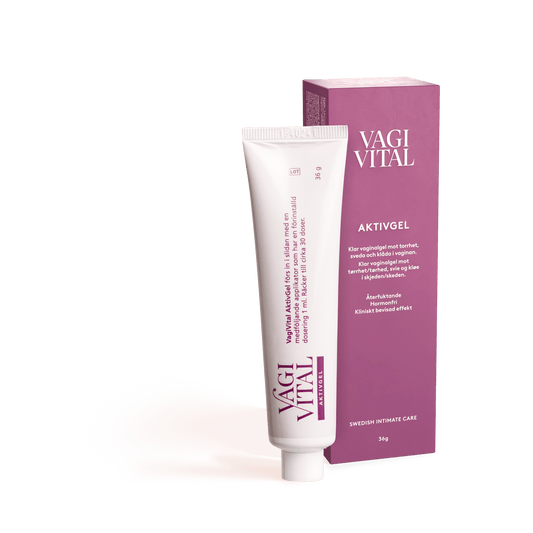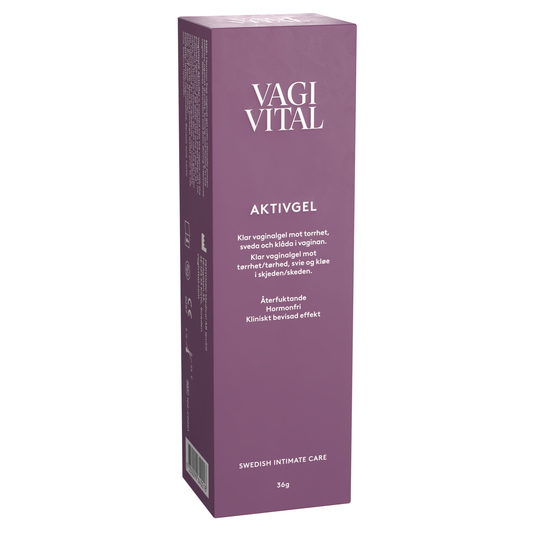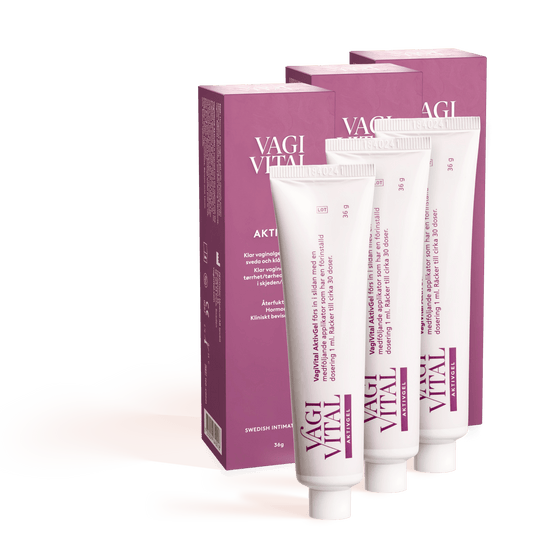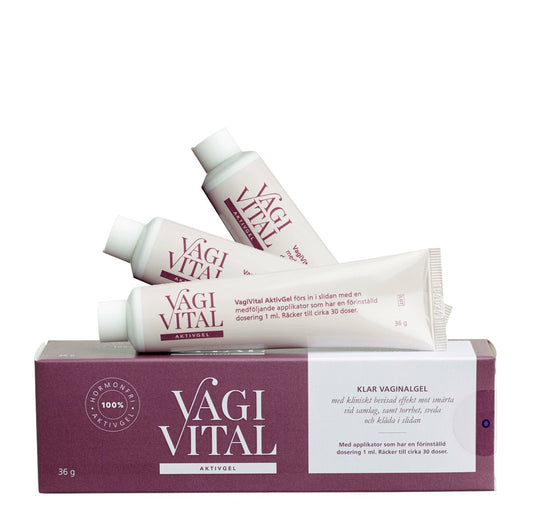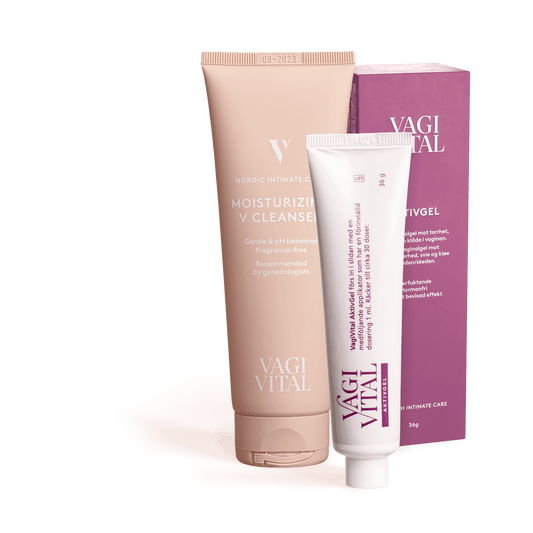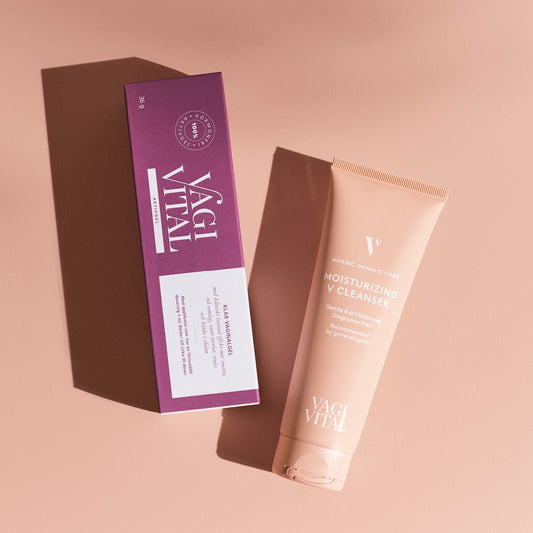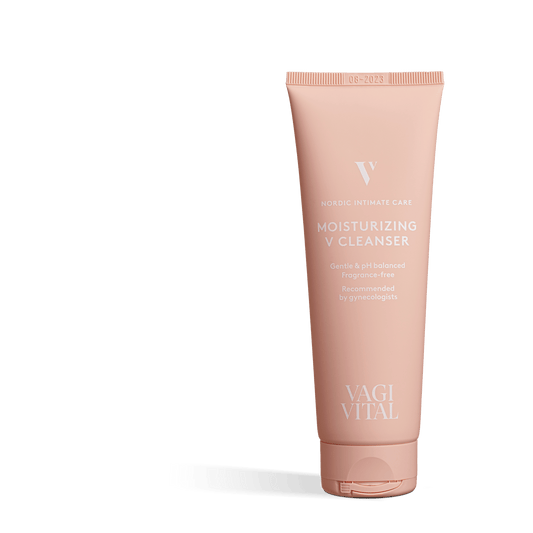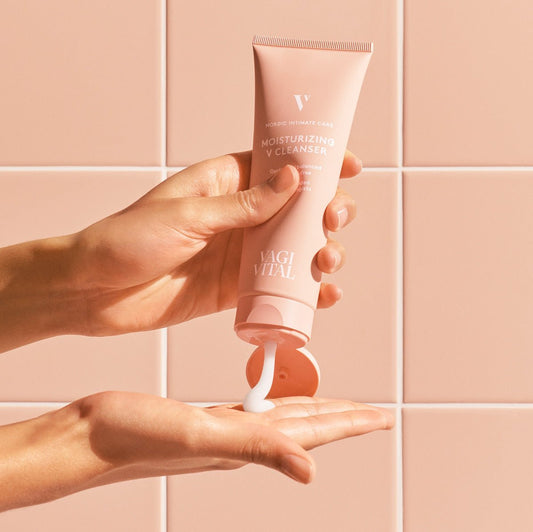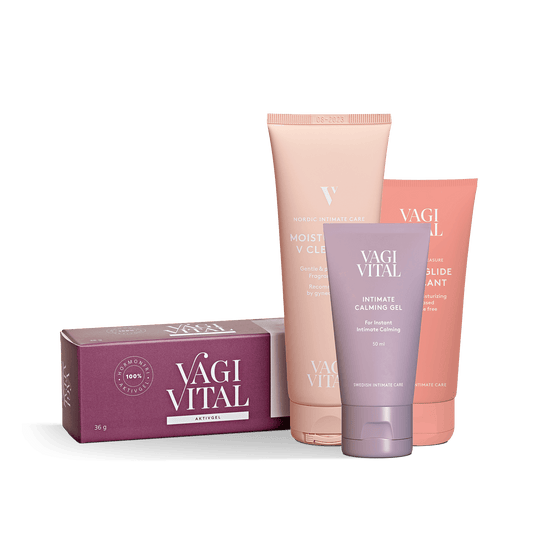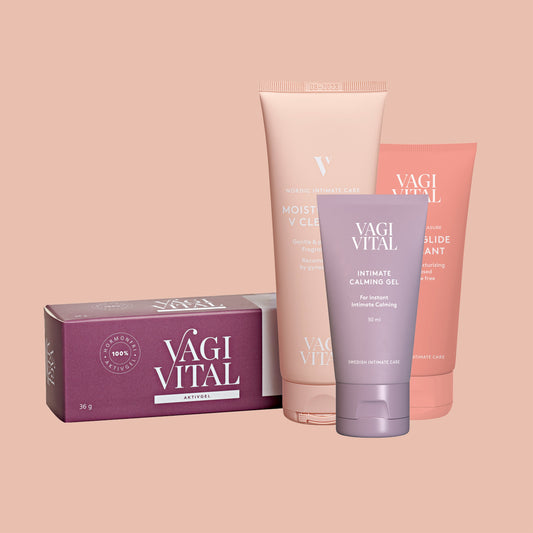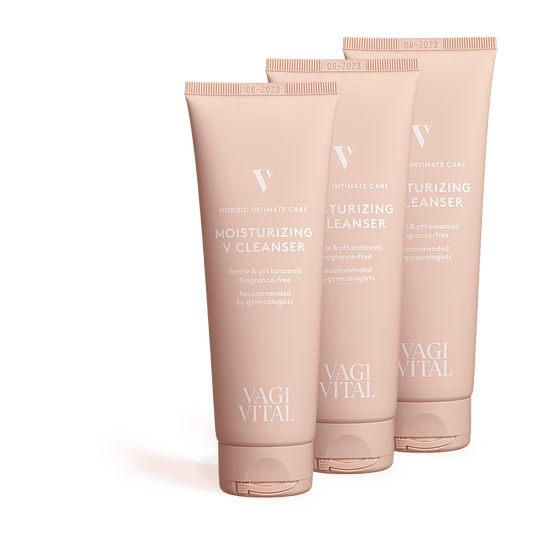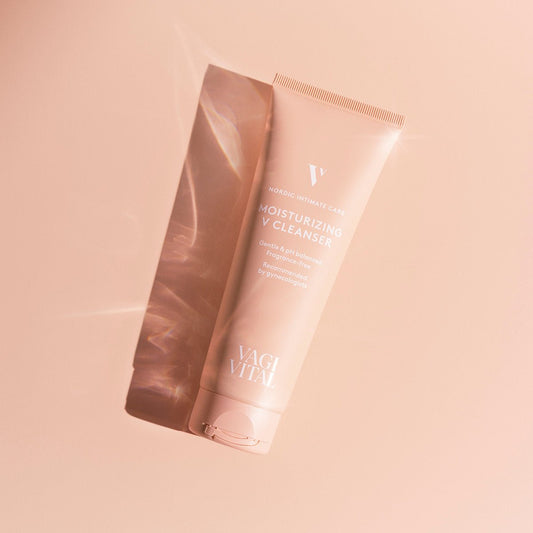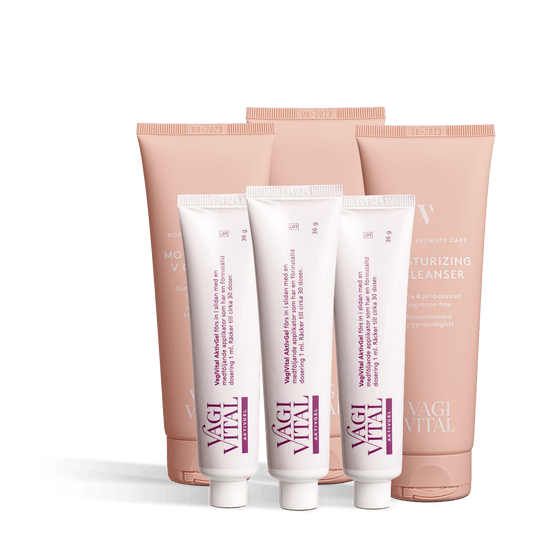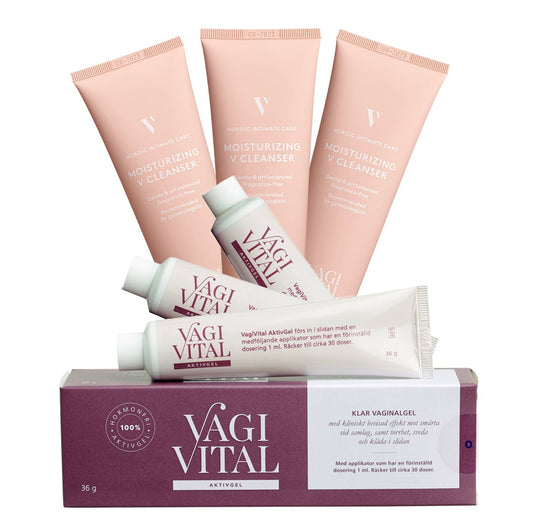I AM A CLIMACTERIC WOMAN
Fanny Falkman Grinndal is the Sweden manager for VagiVital and also a 49-year-old mother of four. Read her personal thoughts and experiences about menopause.
The word menopause has become something of a trendy term that is now found just about everywhere, but what does it really mean?
VagiVital Menopause FSH test can be found here https://vagivital.se/products/vagivital-menopaus-fsh-test
CRITICAL PERIOD
The word menopause comes from the Greek klimakterikos which means critical. So, half the population is supposed to somehow get through a critical period? That doesn’t sound very fun? A time in life that can also be experienced as somewhat vague since it is very unclear when this critical transition period officially starts or ends. No woman really knows in advance what awaits her – since all the ailments we have read about are also individual. Most of us of course understand that menopause means the eggs run out, estrogen levels drop, and we stop having periods. But that doesn’t really answer the question of how or when this will happen and what awaits after menopause?
MENOPAUSE – AN UPWARD CURVE
I believe words make a difference. Personally, I feel that the word menopause is a bit like a wet blanket of resignation. Most things about menopause are mainly about all the painful things happening in both our body and brain. Thousands of women 50+ suffer from symptoms such as; dry mucous membranes, mood swings, hot flashes, body aches, dizziness, palpitations, depression, sleep difficulties… the list seems never-ending. Where do you find poise and strength from that?
Can we change the word? MENOPAUSE maybe? There we go. Better?! A climax with a curve that goes straight up instead of down. With an approach where women 50+ own a natural poise and move through life with a certainty without insecure anxiety or self-criticism. That’s how I want it. Experienced, wise, and cool women who say YES because they want to and NO when they don’t.
FIND OUT IF YOU ARE IN PERIMENOPAUSE/MENOPAUSE
VagiVital Menopause FSH test for perimenopause/menopause is designed to provide an indication if you are in perimenopause/menopause by measuring certain hormone levels. It can help you gain a better understanding of the symptoms you are experiencing and facilitate the decision on possible next steps, such as seeking professional medical advice or exploring appropriate treatment options. You can find the VagiVital Menopause FSH test here https://vagivital.se/products/vagivital-menopaus-fsh-test
INFORMED CHOICE
How can we own our own menopause? I believe we must start by gathering knowledge, which can sometimes be easier said than done. Despite the abundance of information about menopause, many of us are actually more confused than ever. We try to interpret our own bodies and figure out if we are just “high-performing-good-girls-with-stress-symptoms” or if we are actually in menopause. A large part of my conversations with friends is about interpreting the body's signals and trying to understand if it is due to menopause or something else. Life goes on simultaneously with both highs and lows, midwinter darkness and blackbirds singing in the spring. Life is both light and dark whether you are in menopause or not. It may be somewhat easier to understand bodily signals such as night sweats than a sudden outburst of anger or dark depression. We try to sort and understand, and that is good. Talking with other women, listening to podcasts on the subject, reading articles and books about menopause makes a difference. In the flow of information about menopause, opinions sometimes violently diverge and sometimes form different camps where much of the debate seems stuck on what is right or wrong. But knowledge is power, and by making our own informed choice based on what we believe is best for us, we can choose if and how we want to treat our symptoms.
THE THREE PHASES OF MENOPAUSE
For me, it has helped to understand menopause by learning more about each phase, but there is some confusion because the Swedish term Klimakteriet generally includes the entire period, while in English, people talk about three different phases of menopause.
Premenopause, or perimenopause, is the phase when estrogen production begins to change and most women experience more irregular periods. On average, women have nearly four years of irregular periods before their last menstruation. This is when hormones can start to get really tangled, which usually occurs in the 40s. Since we talk far too little about menopause, women do not always understand that their symptoms may be related to perimenopause.
Common symptoms during Premenopause/perimenopause:
- Irritation
- Mood swings
- Sleep problems
- Heavy bleeding
- Tender breasts
- Iron deficiency
- Weight gain
- Shorter menstrual cycle
Menopause is when a woman has her last period – and it is around menopause that hot flashes and sweating can become troublesome for some. During the climacteric, estrogen drops to permanently low levels. Many women suffer through this period if they do not get the help they need. Menopause – the last menstruation – occurs on average at 51.4 years of age.
Common symptoms during menopause/climacteric:
- Dry mucous membranes
- Night sweats
- Hot flashes
- Fatigue
- Joint pain
- Anxiety & depression
- Sparse/less/no menstruation
- Recurring urinary tract infections
VagiVital Menopause FSH test can be found here https://vagivital.se/products/vagivital-menopaus-fsh-test
Postmenopause, or after menopause, is the phase that begins after the last period, when estrogen production eventually settles at a very low level. Perhaps this phase is what can truly be defined as THE CLIMAXTERIC PERIOD, as many women find it nice not to worry about contraception and are happy no longer to have periods. Dry mucous membranes can generally be a recurring problem, but there is actually help available for this.
For me personally, it feels both significant and meaningful to work on something that can help millions of women with this problem, and my heart warms when I read reviews from our customers. Stories from women who have long suffered greatly from dry mucous membranes, burning, and itching, which have made everyday life a torment and made even thinking about any form of active sex life seem completely impossible. Being part of making a difference in women's lives in this way is something I am truly proud of.
You can find VagiVital AktivGel here
Common symptoms during Postmenopause:
- Dry mucous membranes
- Dry eyes
- Joint problems
- Urinary tract infections
- Thin hair
WHAT PHASE AM I IN?
I suspect that I myself am somewhere between perimenopause and menopause. After a year without menstruation, you can expect not to get your period back and I am not quite there yet. Every time my period returns, I also have mixed feelings, partly a tenderness towards my body that still ovulates and proudly I like to tell my family (which includes teenage sons) that “Now the period has come”. At the same time, I am prepared for MENOPAUSE. Because that is how I want it. My physical ailments are also not much to talk about yet and there is quite a bit of help available for them, but my own attitude towards menopause can only I own.
MY SIX BEST TIPS FOR MENOPAUSE
1. Read up! Knowledge is power. Educate yourself about hormones and menopause, find out what treatments are available and consider your own symptoms. Search Facebook groups and podcasts about menopause, read articles, research, and books on the subject and make sure to form your own opinion so you can make an informed choice about which treatment is right for you. It sometimes requires patience and critical review but is worth every second as you learn about your health ❤
2. Talk about menopause! All 50+ women go through this phase but far too few talk about it. My experience is that every conversation on the subject is greatly appreciated but there is a kind of lingering shyness that limits us. Women have a longing to share experiences. Be the first to bring up the subject if no one else does. An effective way to start a conversation about menopause is simply to share your own thoughts.
3. Clean up your feed on social media. Make sure to surround yourself with people who make you happy, strengthen you, and inspire you. Are you in menopause? Add some 50+ Power women. I myself love the actress Katrin Sundberg, who also performs the show “I do whatever the hell I want”. Which friends make you feel good? Meet them more often!
4. Get a good gynecologist! If it feels right, it is generally good, but if it doesn't feel quite right, then you should change. It's not always that easy because there is a shortage of gynecologists in Sweden and there are also parts of our country where there is a very limited supply of gynecologists. Ask around for tips from other women, for example in a Facebook group about menopause.
5. If you can sleep, then do it – without shame! A lot and often. Sleep makes a big difference for our well-being but is also something many women struggle with during menopause. Can you take a little power nap in the afternoon? Do it! During menopause, sleep is generally more easily disturbed and restless. There are a multitude of ways to facilitate a good night's sleep, see point 1 ❤ and also talk to your gynecologist, see point 4 😊
6. Sex during menopause? Yes, absolutely! If you want to. Some women long for sex but have difficulty having vaginal intercourse due to dry and fragile mucous membranes. For this problem, there is help available where VagiVital AktivGel can make a big difference. It is actually also a myth that all women lose desire with age. Some women experience increased sex drive during menopause because estrogen levels drop, allowing testosterone, which controls sex drive, to gain a slight advantage. That women do not get as wet during menopause is another myth. The mucous membranes can become more fragile but the ability to get moist generally does not change. However, sometimes it takes a little time to get wet. Make sure you take that time with yourself or your partner. It is important that your partner is also aware of the phases you experience through menopause. Talk about what is happening inside you and with your body and explain what you need. Do you know what you need? Find out and make demands ❤ If you completely lack desire but wish it was there? Try going back to square one with lots of skin-to-skin contact, tactile touch, tender and long hugs without pressure for sex – which again presupposes that you talk with your partner.
I have decided that menopause will not limit my life. I want an upward life curve and menopause is something I have decided to embrace as a strength. The knowledge and experience that women 50+ have IS a strength! I don't take any bullshit but I also choose my battles and make sure to conserve my energy. I have studied thoroughly and I know what is best for me. In a way, I am more selfish today than 10 years ago – and I think that is good. I take better care of myself on all levels and maybe I will need to make more changes over time to maximize my own well-being but today I feel good and gladly call myself a menopause woman.
Take care of yourselves ❤️
Fanny Falkman Grinndal
A 49-year-old mother of 4 & Sweden manager for VagiVital
Recommended products for you
- Choosing a selection results in a full page refresh.
- Opens in a new window.
